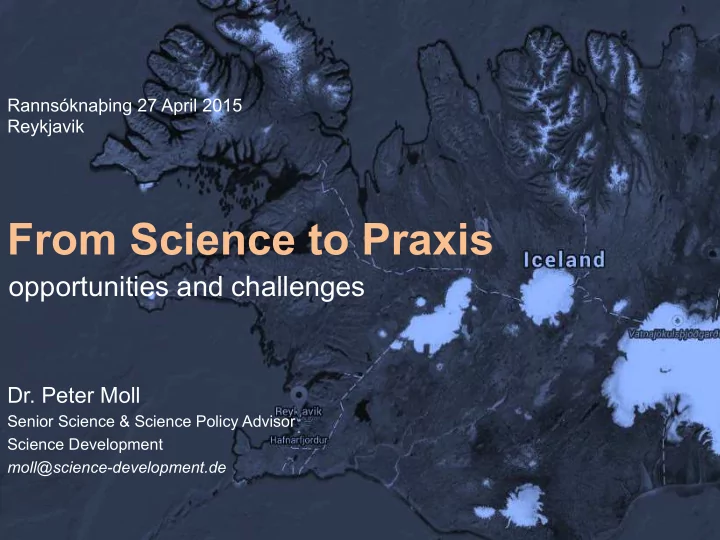

Rannsókna þ ing 27 April 2015 Reykjavik From Science to Praxis opportunities and challenges Dr. Peter Moll Senior Science & Science Policy Advisor Science Development moll@science-development.de
Origin ¡of ¡science ¡disciplines some 400 years ago - pre-/industrialisation in Europe the first scientific academies in GB: exclusion of the ‘human factor’, exclusion of everything beyond the ‘purity’ of the lab science as a ‘deliverer’ to the needs of industrialisation
Measuring ¡nature ¡
From Measuring to Conquering Nature 1605 Sir Francis Bacon – The Advancement of Learning 1661 Foundation of the Royal Society, London - just before that: Leap to quantification - measuring nature under circumstances of ‚objectivity‘ -> the dream of everlasting progress -> the dream of conquering nature
New challenges - huge problems of unsustainability new limits are of global nature: e. g. 9 planetary boundaries wicked problems : complex, structural and systemic / hard to manage and resolve solutions urgently needed in all involved contexts of local / national, regional, and global development
strong growth of multi-, inter- and transdisciplinary research
e.g. climate and land use change
e.g. urban development São ¡Paulo ¡ January ¡2015 ¡ Photo: ¡Reuters ¡
Need of multi-, inter-, transdisciplinarity Many current problems only to be observed, analysed, addressed by pluridisciplinary research: multi-, inter- and transdisciplinarity strong development from the 1990s to today
Something has changed in the academy...
Possibilities / what can be gained strong growth rates for this kind of research / need of recognition / understanding & support possibilities for applied knowledge : Icelandic research could build knowledge in various areas of TD and ID research more easy to gain international visibility and connectivity than in classical disciplinary research problem analyser AND contributor to problem- solving
Possibilities / what can be gained
Challenges unused ¡/ ¡more ¡tricky ¡to ¡set-‑up, ¡support ¡/ ¡evaluate, ¡ communicate ¡ esp. evaluaEon … new ¡objecEves ¡and ¡roles ¡/ ¡funcEons ¡ -‑> ¡ ¡learning ¡by ¡doing ¡ -‑> ¡ ¡make ¡use ¡of ¡available ¡experiences ¡ ¡
8 Principles from VISION www.visionrd4sd.eu ¡ Science ¡funders ¡envision ¡ ¡ new ¡forms ¡of ¡supporEng ¡ ¡ Sustainable ¡Development ¡
8 Principles from VISION Joint Agenda Setting Co-Design, Co-Production, Co-Delivery and Co-Interpretation of results Process-oriented and adaptive programme management Adapted Evaluations Systemic Approaches Communication, Empowerment Engagement and Exploitation Career Opportunities and Recognition Capacity Building
Recommendations (1) Start with one programme (Icelandic problems / interests) Involve stakeholders from the very beginning / Co- Design the programme with them and scientists from all relevant disciplines (natural and social sciences, humanities) Get expert support - from outside / consultants with much experience in supporting TD and ID research “proactive evaluation” panels fitting to the objectives of the programme
Recommendations (2) Involve from very early on independent observers and public media to share results co-design the programme with young / early career scientists and to give them opportunity to carry on with the experience made Cyclic interaction (lessons learned): Reserve time and funding to evaluate the whole process and to make it possible to learn from the overall experience
Much of what is needed is already taking place
Tabara, ¡J.D., ¡Chabay, ¡I., ¡Coupling ¡Human ¡InformaEon ¡and ¡Knowledge ¡Systems ¡with ¡social–ecological ¡systems ¡change: ¡Reframing ¡research, ¡educaEon, ¡and ¡ policy ¡for ¡sustainability, ¡Environ. ¡Sci. ¡Policy ¡(2012), ¡hVp://dx.doi.org/10.1016/j.envsci.2012.11.005 ¡
New roles for scientists and science funding • Dealing with open knowledge systems • Cooperation within and beyond the school / academia • Listen to others • Recognition and integration of other forms of knowledge • Brokering knowledge • Open communication / transparency • Remain independent …
Support Definitions hand-out Experiences of others – see link list www.visionrd4sd.eu Tool Box from this project / initial list of criteria, literature, experiences made etc. available at: http://infact.formas.se/preview/20- VISION_RD4SD_Resource_Tool___test_version/index.html#/21 Reykjavik Briefing : Paper written after the Final conference of this project – open to use for communication of the mentioned need for TD, ID and MD research
Thank you for your attention ¡ ¡ ¡ Dr. ¡Peter ¡Moll ¡ ¡ ¡ ¡moll@science-‑development.de ¡ ¡
Recommend
More recommend